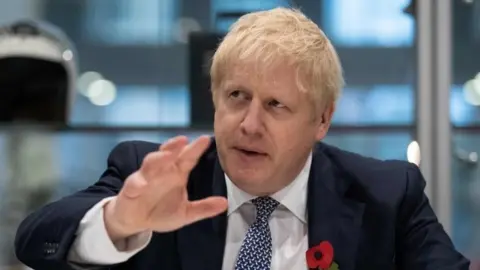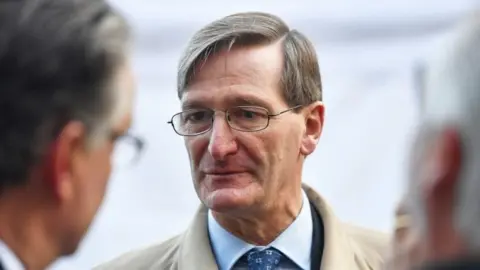Boris Johnson faces calls to publish Russian interference report
 Getty Images
Getty ImagesBoris Johnson is facing renewed calls to release a report assessing the threat posed by Russia to the UK's democratic processes.
Former attorney general Dominic Grieve said its release was vital ahead of the general election because it contained information relevant to voters.
Mr Grieve, chairman of Parliament's Intelligence and Security Committee, has accused the PM of sitting on the report ahead of the 12 December poll.
The report was finalised in March 2019.
Compiled by the Parliamentary Intelligence and Security Committee, it includes evidence from UK intelligence services concerning Russian attempts to influence the outcome of the 2016 EU referendum and 2017 general election.
The process for clearing it on security grounds was completed in the middle of October, but it has since been with Downing Street for final release.
Mr Grieve - who sits as an independent MP for Beaconsfield after losing the Conservative whip - said the usual 10-day wait for release has passed, and if it is not published before Parliament dissolves on Tuesday it will not be published at all.
He told BBC Radio 4's Today programme: "I cannot think of a reason why he should wish to prevent this report being published.
"It's very demoralising for us when we find we put in months of work and at the end of it we're not getting an adequate response."
Business Secretary Andrea Leadsom said she was not aware of any hold-up. Speaking on the Today programme, she added: "I don't think there's anything unusual about this.
"Many select committee reports are produced and the government has to respond properly, it cannot respond in haste."
 PA Media
PA MediaIt is understood Mr Grieve had been hoping to publish the report on 28 October.
The committee heard evidence from UK intelligence agencies such as GCHQ, MI5 and MI6 about Russian attempts to interfere in the 2016 EU referendum and the 2017 general election.
Previous disclosures would suggest these Russian activities did not match the scale of those directed against the 2016 US presidential election, and even in that case, there is considerable debate about how far people were actually influenced by these actions.
Asked if there is useful information in the report for voters, Mr Grieve said: "Yes I think there is. It's about information.
"I want to emphasise I'm not about to explain what's in the report, I'm not allowed to and I wouldn't dream of doing so.
"But the report is informative and people are entitled to information. It seems to us that this report is germane because we do know and I think it is widely accepted that the Russians have sought to interfere in other countries' democratic processes in the past."

Analysis
By BBC security correspondent Gordon Corera
Extensive evidence has been unearthed of Russian interference in US politics thanks to investigations like the Mueller inquiry, but less has emerged when it comes to UK elections, including the Brexit referendum.
And that is one reason why this report, simply entitled Russia has been so anticipated.
How much evidence is there? It may be less than some hope but more than others expect.
The committee's investigation is set against the wider challenge posed by Russian espionage and subversion directed against the West - which can range from cyber-hacking through social media activity to covert influence through individuals.
This could potentially mean it treads on sensitive areas politically, but those who want to see the report released believe it is vital for the public to have an informed understanding of what Moscow and its agents are really up to as the UK heads to the polls.

Labour leader Jeremy Corbyn echoed Mr Grieve's call for the publication of the report, asking what the government "have got to hide".
"Yes it should be released," he said on Saturday.
"And I suspect that the reason it hasn't been published is because they're going to delay it past the dissolution of Parliament on Tuesday and then they can hide it away until some point in the future.
"If a report has been called for and written, and it should be in the public domain, then what have they got to hide?"
During a campaign visit in Kensington, west London, Liberal Democrat leader Jo Swinson called allegations of Russian meddling in British politics "deeply worrying".
She said Mr Grieve's stressing it should be published had given her "cause for concern that the government is deliberately hiding it".
She added that it "would be relevant heading into an election that the report is in the public domain".
